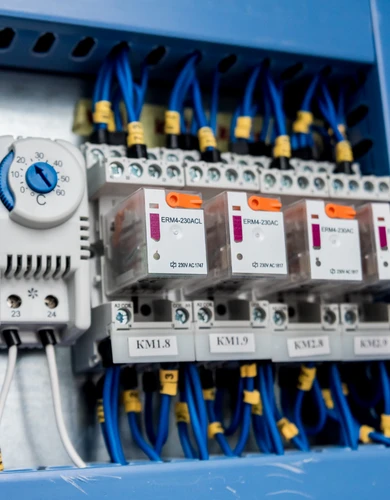Meter Operators for business energy customers
Meter Operators (MOPs) are responsible for installing and maintaining electricity meters in commercial properties.
Appointing a Meter Operator is mandatory for businesses with half-hourly electricity meters. However, most businesses fulfil this requirement by having a MOP contract included as part of their business energy tariff.
In this guide, we explain the role of Meter Operators, focusing on what matters most to businesses, including how to save on Meter Operator fees by having a standalone MOP contract.
Here’s what we cover:
- The role of a Meter Operator
- Choosing a Meter Operator
- Meter Operator contracts and pricing
- Meter Operators regulations
- Data management and Meter Operators
The role of a Meter Operator
In this section, we summarise the three main responsibilities of Meter Operators in managing electricity meters for commercial properties.
Installation of electricity meters
Meter Operators are responsible for installing new half-hourly meters in properties with a high maximum demand for electricity.
They ensure installed meters comply with industry regulations and deliver accurate automatic meter readings every thirty minutes.
For more information, visit our full guide to the installation of business electricity meters.
Maintenance and servicing
Meter Operators carry out regular maintenance to ensure meters function correctly and transmit accurate readings.
Commercial energy meters are generally highly reliable, but MOP regulations require maintenance and servicing at least once every five years.
If the meter malfunctions or fails, the MOP is responsible for diagnosing and resolving the issue.
Data communication
MOPs ensure that commercial electricity meters communicate accurate and timely energy usage data to:
- Energy suppliers for billing purposes.
- Data Collectors (DCs) for aggregation and settlement.
The data communication services provided by Meter Operators eliminate the need for businesses to take manual energy meter readings.
💡The data communication roles of MOPs will change under the Market-wide Half-Hourly Settlement reforms in 2027.
Types of meter covered
Meter Operators are responsible for managing a variety of business electricity meter types. Here are the most common examples:
- Half-hourly meters – Designed for non-domestic properties with high business energy consumption, requiring precise and frequent consumption data.
- Smart business energy meters – Designed for small business energy customers with moderate energy needs.
Meter Operator appointments are only mandatory for half-hourly electricity meters.
For other meter types, your energy supplier can manage your meter directly rather than appointing a Meter Operator.
Choosing a Meter Operator
It is not necessary to choose a Meter Operator yourself. If you have not appointed a Meter Operator, your business energy supplier will appoint one on your behalf and include MOP charges as part of their business electricity rates.
An independent MOP contract may offer more competitive rates compared to having this service bundled into your business energy contract.
We recommend selecting a Meter Operator from our panel of trusted business energy suppliers that we partner with to provide our business electricity comparison service:
- EDF business energy – Request a MOP quote on EDF’s webpage.
- British Gas for Business – British Gas does not offer separate MOP agreements but provides this service directly to their customers with half-hourly meters.
- E.ON business energy – Request metering services on E.ON’s Meter Operator webpage.
Alternatively, the Association of Meter Operators provides a full list of licensed Meter Operators for you to choose from.
Meter Operator contracts and pricing
There are two ways businesses with half-hourly meters pay for their Meter Operator.
Bundled into energy rates
Most large business energy customers pay for MOP contracts as part of their business electricity rates.
When business energy suppliers provide quotes to businesses with half-hourly meters, two sets of prices are typically offered:
- Including MOP fees.
- Excluding MOP fees, for businesses with a standalone MOP contract.
Business electricity quotes that include MOP fees usually have higher daily business electricity standing charges.
Standalone Meter Operator agreement
The industry standard for a standalone Meter Operator contract is a five-year agreement that includes the following charges:
- Installation fee (if applicable) – A one-time upfront cost for installing or upgrading the meter and ensuring it is correctly configured to communicate data to your supplier.
- Annual service fees – An ongoing charge for monitoring and maintaining the meter, ensuring it meets regulatory requirements.
- Data collection and communication charges – An ongoing fee covering the cost of transmitting your energy usage data to your supplier.
Meter Operators regulations
The operators of the British national grid and regional distribution network operators rely on the real-time consumption data provided by Meter Operators to balance supply and demand effectively.
Given the vital role played by Meter Operators, they are carefully regulated. In this section, we explain the regulatory framework governing Meter Operators.
Balancing and Settlement Code
The Balancing and Settlement Code (BSC) is a fundamental component in the operation of the energy market in Britain, ensuring:
- Balancing supply and demand – Ensures electricity supply matches demand in real time to avoid blackouts or surplus energy.
- Settlement of energy imbalances – Manages the financial consequences when generators or suppliers deviate from their contracted energy positions.
Accurate metering data is essential for calculating imbalances and settlements. The BSC directly regulates Meter Operators to ensure accuracy by setting standards for installations, data collection and communications.
The Balancing and Settlement Code is administered by Elexon, a non-profit organisation that governs electricity trading and settlement in Britain.
Ofgem regulation of Meter Operators
Ofgem is the primary energy regulator in the UK, responsible for setting and enforcing rules related to metering and data handling.
Ofgem approves changes to and guides the Balancing and Settlement Code. It also monitors MOP activities to ensure fair practices, consumer protection, and adherence to technical standards.
Unlike commercial electricity and business gas suppliers, Ofgem does not directly license Meter Operators.
Read our full guide to Ofgem’s role in business energy for more information.
Other Meter Operator regulations and standards
The following two additional regulations apply directly to the work of Meter Operators:
- Electricity Metering Standards (Accuracy of Meters) Regulations 2006 – Establishes accuracy requirements for half-hourly and other meter types.
- General Data Protection Regulation (GDPR) – Requires Meter Operators to secure meter reading data against unauthorised access.
Data management and Meter Operators
Data management is a critical component of the services provided by Meter Operators, who must ensure the accurate and efficient handling of energy consumption data.
Here is a summary of the key responsibilities of Meter Operators in data management:
- Data accuracy – MOPs ensure meters are properly calibrated to provide accurate meter readings.
- Data collection – MOPs maintain the communication systems used for the remote retrieval of half-hourly meter reading data.
- Data transmission – MOPs ensure the accurate and timely transfer of meter data to energy suppliers and Exelon.
- Data validation – MOPs ensure the integrity of meter reading data, including flagging anomalies for further investigation.

